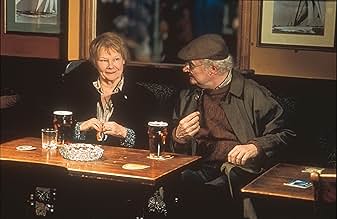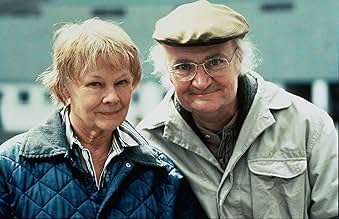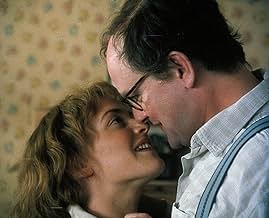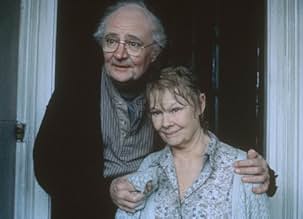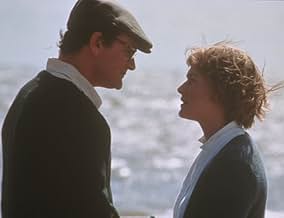True story of the lifelong romance between novelist Iris Murdoch and her husband John Bayley, from their student days through her battle with Alzheimer's disease.True story of the lifelong romance between novelist Iris Murdoch and her husband John Bayley, from their student days through her battle with Alzheimer's disease.True story of the lifelong romance between novelist Iris Murdoch and her husband John Bayley, from their student days through her battle with Alzheimer's disease.
- Director
- Writers
- Stars
- Won 1 Oscar
- 14 wins & 31 nominations total
- Young Maurice
- (as Sam West)
- Director
- Writers
- All cast & crew
- Production, box office & more at IMDbPro
Featured reviews
I knew of this film due to Broadbent rightly taking the Oscar for it (with an exclamation of `stone the crows!') but I noticed it wasn't really in the running for anything else and never got round to seeing it. Seeing it now I am in two minds as to whether it works or not - I think it depends on what you take the film's aim to be. As a story about Iris herself I didn't think it really worked. It told me very little about her and didn't give me much to work with in regards her character or her relations when she was younger. We are given images and scenes from Iris and John's youth but I never felt that I ever really connected with who they were at that young age. The stuff with them as an elderly couple works well but again it could have been any elderly couple and it made no difference to me that Iris was a writer or any woman.
What works excellent is the portrait of an elderly couple struggling with the effects of Alzheimer's on their lives - hers as a sufferer and his as one watching his wife vanish day by day. I was very moved by all of that side of the film and found some of it very hard to watch. Most of this is due to Broadbent and it is this that he won his Oscar for. I felt his pain throughout the film and it was intense considering what a normal cheerful old man he played. Dench is excellent and her portrayal of Iris is very strong in terms of being an Alzheimers sufferer but not so much as a character I'm meant to learn about. The playing of both Winslet and Bonneville is good but I came away with the feeling that they were just assigned to do impressions of their senior co-stars; they don't manage to shed light on the past very much but they are good background.
Overall this film is not great if you are expecting to learn about Iris the author. However a film about Alzheimers it excels and is well worth seeing. Broadbent is wonderful and deserved his Oscar - his pain and his loss is so very real throughout the film that it is impossible not to feel something even if the film doesn't manage to do great development with the characters.
The film pulls no punches, showing Iris as a self-absorbed, stream-of-consciousness woman who becomes ill with Alzheimer's disease. Her husband, in sickness and in health, seems to always be a step behind her. However, he is enthralled with her - totally devoted and ultimately alone.
Yet, this portrait is beautiful and episodic, filled with symbolism, wonderful flashbacks, and the threads of a relationship built and undone. The four leads are just wonderful, with Jim Broadbent deservedly receiving an Oscar for his performance. Superb cinematography, editing, and direction support the actors and the great script.
Highly recommended. I give it 9 out of 10.
Iris is played when young by Kate Winslet, whose portrayal veers from playful to irritating. As she grows older she morphs into the wonderful Judi Dench, giving a quite exceptional performance as the mature Murdoch. Playing John Bayley are two actors who uncannily resemble each other - Hugh Bonneville and Jim Broadbent. Broadbent was to win awards for his performance, and rightly so, although Bonneville was no less touching.
In a well-balanced supporting cast we have Penelope Wilton, Sam and Timothy West, Eleanor Bron, and Juliet Aubrey, giving assured performances.
Is 'Iris' truly a movie about a writer, and the business of writing and creativity? Well, no, as her writing is not central to the feel of the piece (although it does touch on her gift for words, and the tragic loss of the ability to process and work with them). It is something of a downbeat film, which will leave the more sensitive amongst you with damp eyes, but essentially it is an exceptional piece of work about the destructive power of dementia and Alzheimer's.
The flashbacks also aren't handled quite right, the interaction between the "present" and past scenes is too jarring. I suspect that it was a conscious choice to do it that way in an attempt to describe the ravages of Alzheimer's, but the film really suffers as a story because of it. This film would have been better served as a straight linear narrative without the constant flashbacks, focusing on either the young or old stage of Iris' life.
But enough with the comparisons. This film stands well on its own as a tribute to the companionship shared by Iris and her husband John Bayley throughout their long, complex, relationship. Broadbent deserved that Academy Award, although I would say he plays more of a lead character than supporting. Seeing Iris through Bayley's loving eyes is what makes the film an enriching experience. He is the one who must adapt to her unconventional lifestyle, and their journey together is a rewarding one.
One person who commented stated that this was "another disease movie." Funny how you never hear a complaints about "another gangster movie" or "another romantic comedy" or "another suspense thriller." SO WHAT? First of all, it is not a disease movie, it is at its heart a romance, and a "meaning of life" film, much moreso than a film about Alzheimer's disease. Secondly, the disease is the device used to illustrate their level of understanding and commitment to each other. And finally, I cannot imagine telling Murdock's story WITHOUT giving the disease its proper weight in the course of the film.
The scenes when the characters are younger are blended seamlessly with the latter day scenes. Kate Winslet and Hugh Bonneville (uncannily resembling a young Broadbent) are very true to their older counterparts' personalities, and add yet another dimension to film. All in all, this is a production of which director Richard Eyre and cast (and Bayley, who wrote the book on which the film is based) should be extremely proud. It should have been seen by more people in 2001. Grade: A
Did you know
- TriviaThis is the second movie to have two actresses nominated for an Academy Award for playing the same role in the same movie. The first was Titanic (1997). In both movies, Kate Winslet played the younger version in the dual-nominee role.
- GoofsWhen John gets his coat caught against the chair at the pub, a boom mic can be seen in the mirror behind him.
- Quotes
Iris Murdoch: Education doesn't make you happy. And what is freedom? We don't become happy just because we are free, if we are. Or because we have been educated, if we have. But because education may be the means by which we realize we are happy. It opens our eyes, our ears. Tells use where delights are lurking. Convinces us that there is only one freedom of any importance whatsoever: that of the mind. And give us the assurance, the confidence, to walk the path our mind, our educated mind, offers.
- ConnectionsFeatured in A Look at Iris (2001)
- SoundtracksThe Lark in the Clear Air
Music: Traditional tune: Caisleán U, Néill
Lyrics by Samuel Ferguson (about 1850)
- How long is Iris?Powered by Alexa
Details
- Release date
- Countries of origin
- Official sites
- Language
- Also known as
- Iris: A Memoir of Iris Murdoch
- Filming locations
- Southwold, Suffolk, England, UK(beach scenes)
- Production companies
- See more company credits at IMDbPro
Box office
- Budget
- $5,500,000 (estimated)
- Gross US & Canada
- $5,594,617
- Opening weekend US & Canada
- $23,144
- Dec 16, 2001
- Gross worldwide
- $16,153,953
- Runtime
- 1h 31m(91 min)
- Color
- Sound mix
- Aspect ratio
- 1.85 : 1



